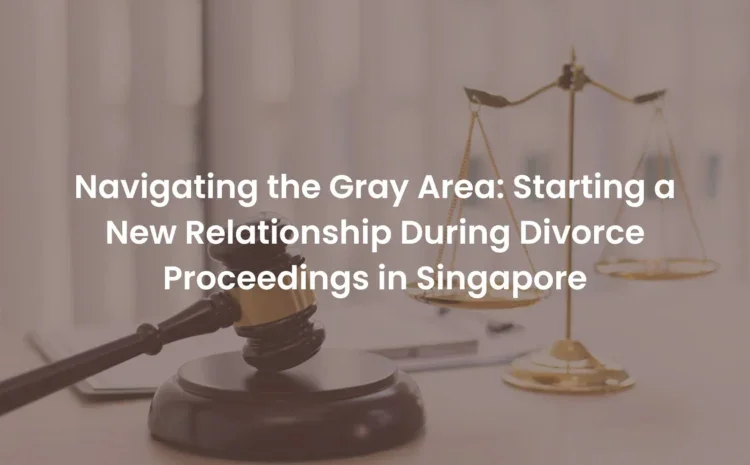Navigating the Gray Area: Starting a New Relationship During Divorce Proceedings in Singapore
Divorce is a tumultuous time in anyone’s life, marked by emotional upheaval and profound change. Amidst the turmoil, it’s not uncommon for individuals to seek solace and companionship in the form of a new relationship. But is getting into another relationship while going through divorce considered cheating under Singaporean divorce laws? Let’s explore this delicate question within the context of Singapore’s legal framework and social norms.
Understanding Singaporean Divorce Laws
In Singapore, divorce is governed by the Women’s Charter, which stipulates that the only ground for divorce is the irretrievable breakdown of the marriage. This breakdown can be evidenced by one or more of the following facts:
Adultery
Unreasonable behavior
Desertion
Separation with consent
Separation without consent
While adultery is grounds for divorce, Singaporean law defines adultery narrowly as sexual intercourse between a married person and someone who is not their spouse. Emotional infidelity or dating during the divorce process may not necessarily constitute adultery under legal terms.
The Gray Area: Is Dating During Divorce Considered Cheating?
The question of whether dating during divorce is considered cheating is subjective and often depends on individual circumstances, cultural norms, and personal beliefs. In Singapore, there is no specific law that addresses dating during divorce proceedings. However, the emotional and ethical implications of starting a new relationship during this time can be significant.
Emotional Impact:
Divorce is an emotionally charged process, and introducing a new romantic partner into the equation can complicate matters further. It may exacerbate feelings of betrayal, anger, or abandonment, especially if one spouse perceives the new relationship as a contributing factor to the breakdown of the marriage.
Legal Considerations:
While dating during divorce may not constitute adultery under Singaporean law, it can still have legal ramifications, particularly in contested divorce cases. If one spouse alleges adultery or claims that the new relationship caused the irretrievable breakdown of the marriage, it could impact the division of matrimonial assets or child custody arrangements.
Navigating the Gray Area: Ethical and Practical Considerations
While there is no clear-cut answer to whether dating during divorce is cheating, it’s essential to approach the situation with sensitivity, integrity, and mindfulness of both legal and ethical considerations.
Communicate Openly:
If you’re considering entering a new relationship during divorce proceedings, it’s crucial to communicate openly and honestly with your estranged spouse. Transparency can help mitigate misunderstandings and foster a more amicable resolution.
Prioritize Self-Reflection:
Before embarking on a new relationship, take the time to reflect on your motives, emotional readiness, and the potential impact on all parties involved, including children, if applicable.
Seek Legal Advice:
Consulting with a qualified family lawyer can provide invaluable guidance on how to navigate the legal complexities of divorce, including any implications of dating during the process.
Conclusion
In the gray area of dating during divorce, there are no easy answers or one-size-fits-all solutions. While it may not constitute cheating under Singaporean divorce laws, dating during divorce proceedings can have far-reaching emotional, ethical, and legal consequences.
Ultimately, it’s essential to approach the situation with empathy, integrity, and a commitment to navigating the divorce process with dignity and respect for all parties involved. By prioritizing open communication, self-reflection, and legal guidance, you can navigate this challenging period with greater clarity and compassion, paving the way for a smoother transition to the next chapter of your life.
Contact our lawyers at 8780-2499 to learn more.

